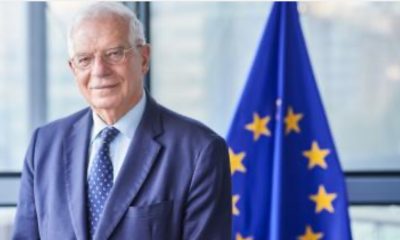Africa
EU support to increase security in Central African region

 Today (27 March) the EU announced that it would provide close to €2 million to support the fight to eliminate the Lord's Resistance Army (LRA), a militant movement in the Central African region. The new contribution will support the Regional Cooperation Initiative for the elimination of the Lord's Resistance Army (RCI-LRA), led by the African Union, in Uganda, the Democratic Republic of Congo, South Sudan and the Central African Republic, for a period of 17 months. It will cover, among other things, staff allowances, communication equipment and operational costs of this initiative.
Today (27 March) the EU announced that it would provide close to €2 million to support the fight to eliminate the Lord's Resistance Army (LRA), a militant movement in the Central African region. The new contribution will support the Regional Cooperation Initiative for the elimination of the Lord's Resistance Army (RCI-LRA), led by the African Union, in Uganda, the Democratic Republic of Congo, South Sudan and the Central African Republic, for a period of 17 months. It will cover, among other things, staff allowances, communication equipment and operational costs of this initiative.
Development Commissioner Andris Piebalgs said: "The Regional Cooperation Initiative has been instrumental in creating a peaceful and secure environment for development in the LRA-affected countries and this is why the EU has been supporting it since 2011. It has degraded the LRA and increased pressure on its combatants to defect. It is essential to sustain the initiative’s operations to eliminate the threat of LRA once and for all."
The LRA remains a destabilising factor in the Central African region, and in particular in South Sudan, the Democratic Republic of Congo and the Central African Republic; this has dire security and humanitarian consequences. The military movement has been causing fear, panic and displacement with brutal actions including killings, rapes and abductions. It is estimated that 353,000 people are still displaced in LRA-affected areas. The LRA leaders were the first individuals indicted by the International Criminal Court in 2005 for war crimes and crimes against humanity, including murder, rape and forced enlistment of children.
In response to the atrocities committed by the LRA, the African Union decided in 2011 to establish the RCI-LRA in order to defeat the LRA in Uganda, South Sudan, the Democratic Republic of Congo and the Central African Republic. The initiative comprises a Joint Coordination Mechanism (JCM) which coordinates the initiative at political and strategic level, involving the African Union Commissioner for Peace and Security and the ministers of defence of the countries mentioned above. It also operates a 'Regional Task Force (RTF)' composed of currently 3,085 military troops from the affected countries.
Background
Today’s funding is provided through the African Peace Facility (APF) which was created in 2004 as the main source of funding to support peace and security in Africa. Since 2004 the EU has provided over €1.2 billion through the APF.
The APF has been effective in backing African efforts in the area of peace and security on the continent by providing predictable aid. It has allowed a number of African-led peace operations to take place, such as the missions in Somalia, the Central African Republic or Mali and provided a significant contribution to the strengthening of African institutional capacities and cooperation in peace and security at the continental and sub-regional level.
The Facility has also supported a number of mediation and conflict prevention actions. It has been used, for example, to support the African Union High-Level Implementation Panel for Sudan and South Sudan, which has played an important role in the attainment of peace and stability within and between the two states.
Furthermore, the APF has contributed to a more comprehensive political dialogue between the EU and Africa in the area of peace and security.
Share this article:
-

 Conferences3 days ago
Conferences3 days agoNatCon’s on-off conference halted by Brussels police
-

 Mass surveillance4 days ago
Mass surveillance4 days agoLeak: EU interior ministers want to exempt themselves from chat control bulk scanning of private messages
-

 Conferences4 days ago
Conferences4 days agoNatCon conference to go ahead at new Brussels venue
-

 European External Action Service (EAAS)4 days ago
European External Action Service (EAAS)4 days agoBorrell writes his job description



























